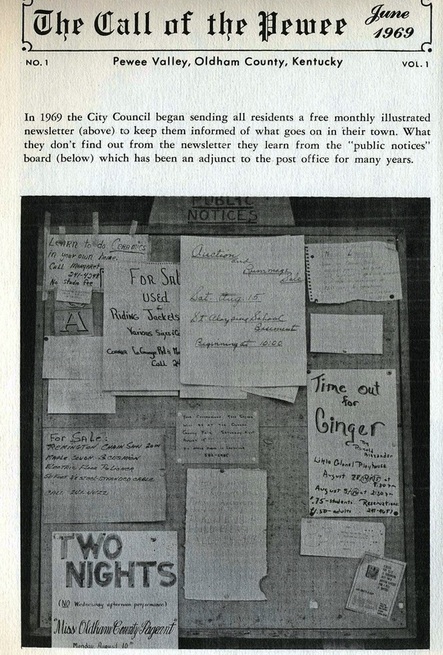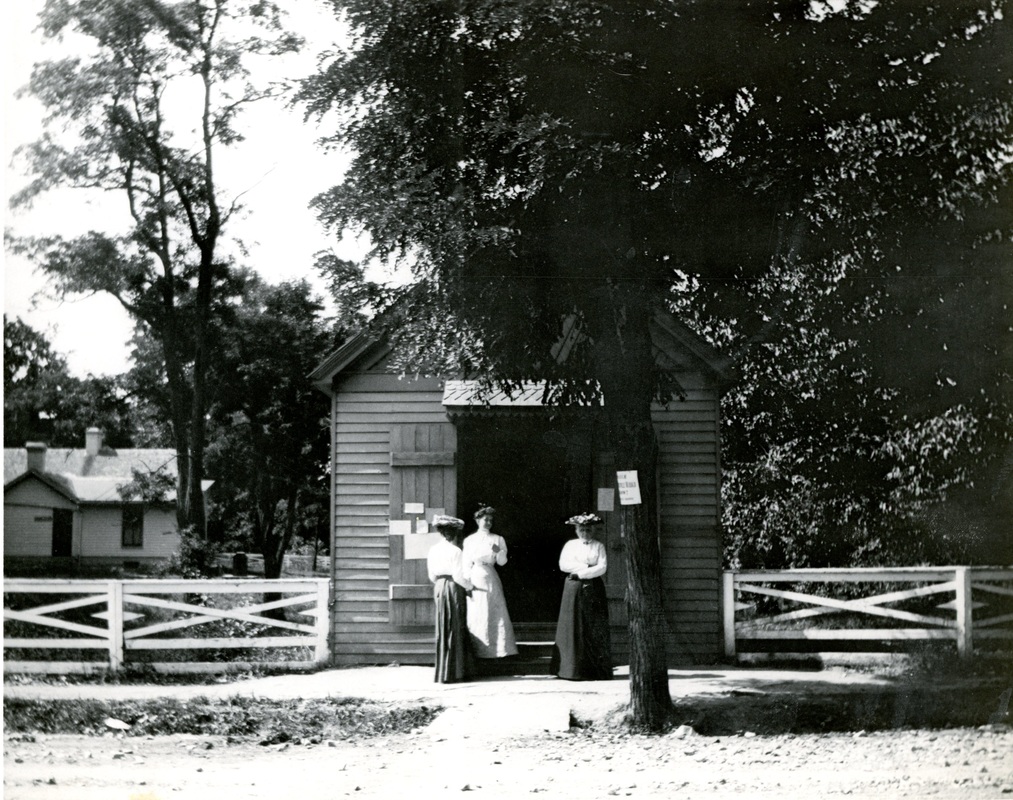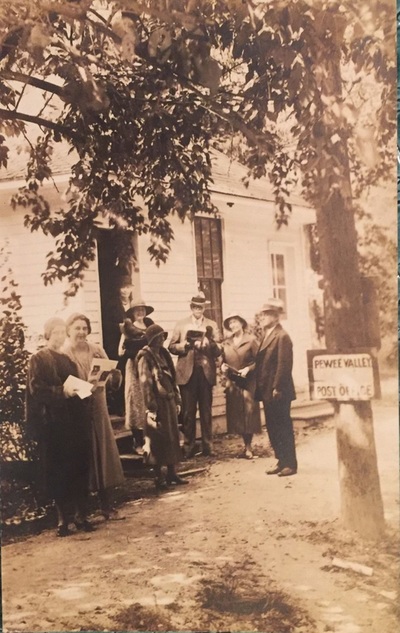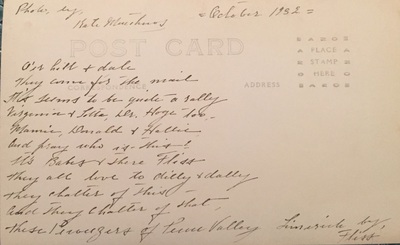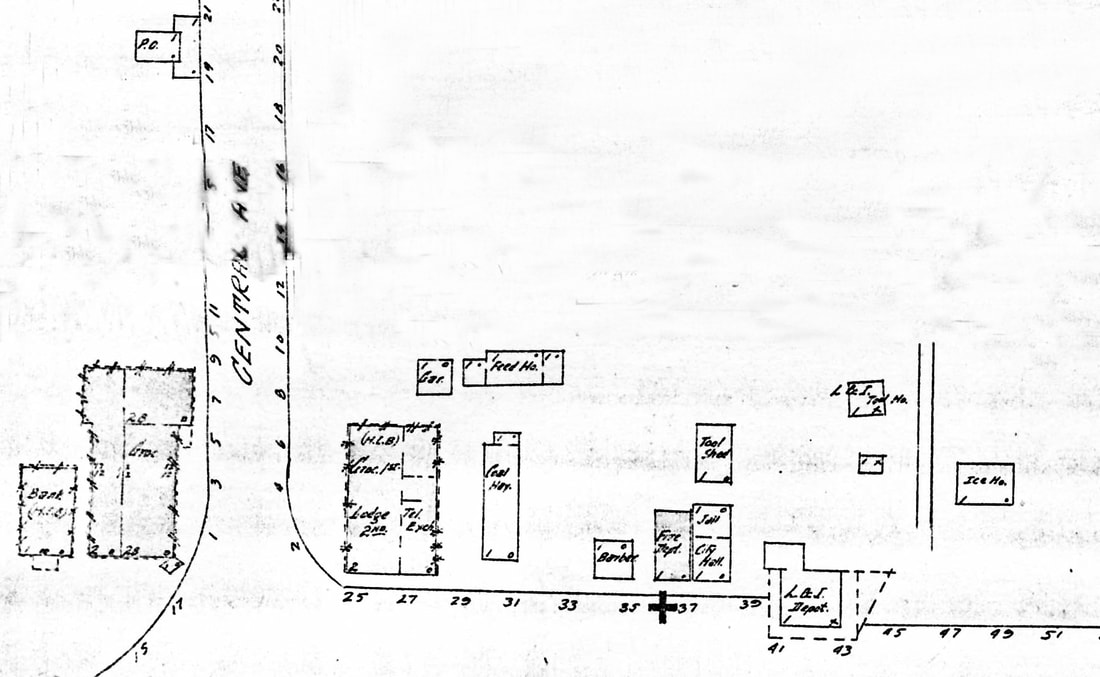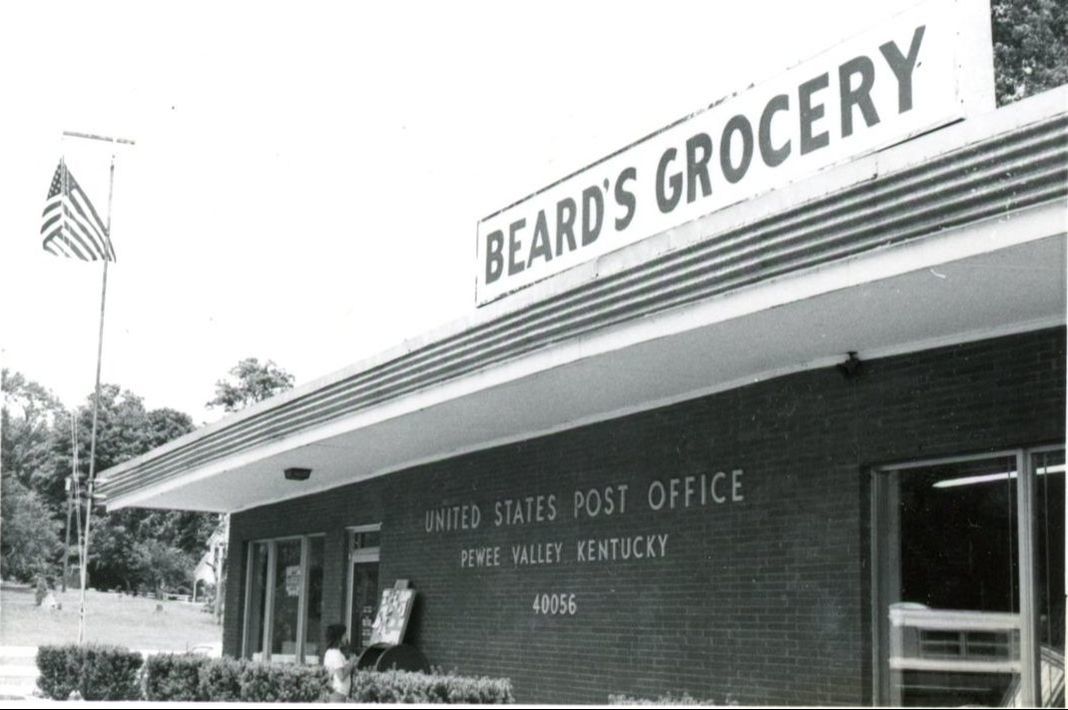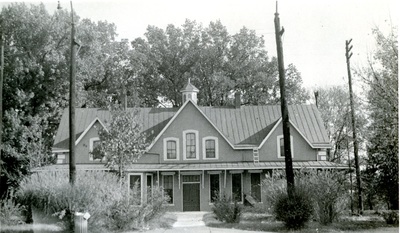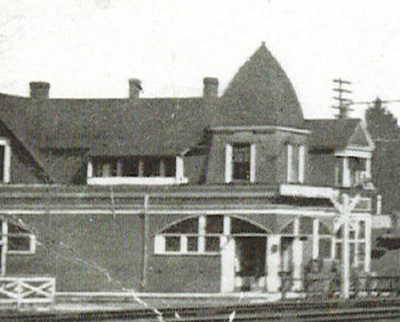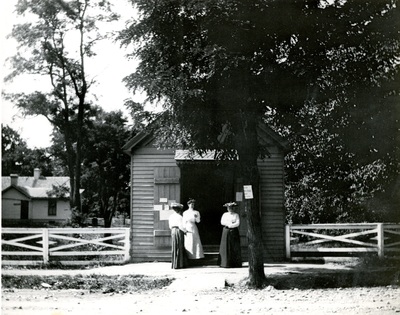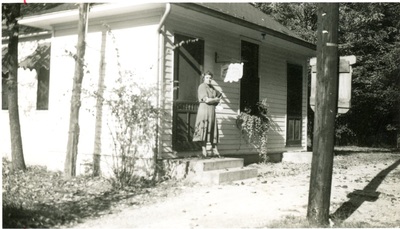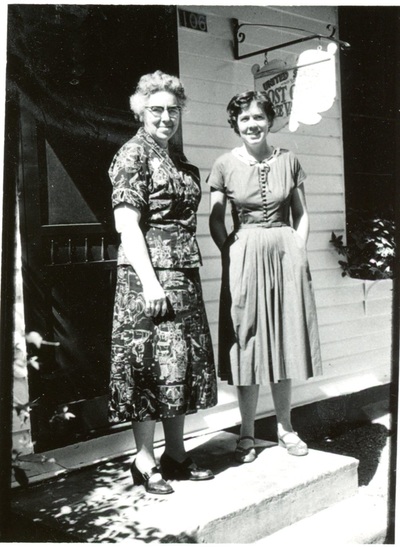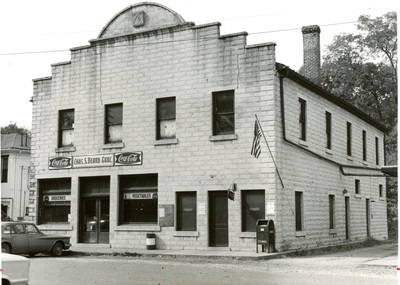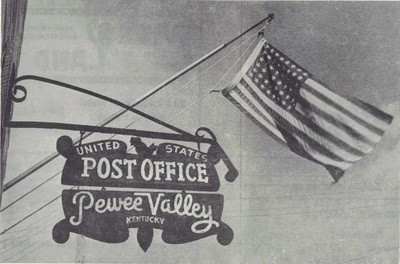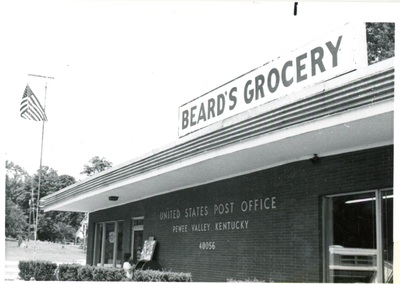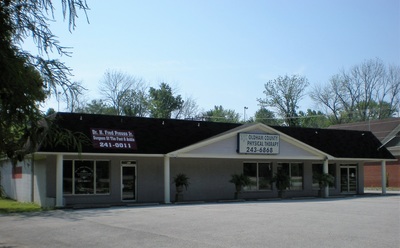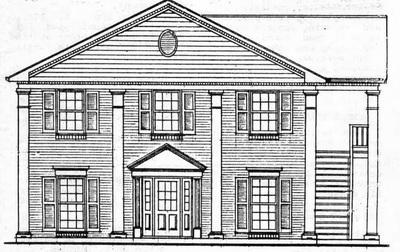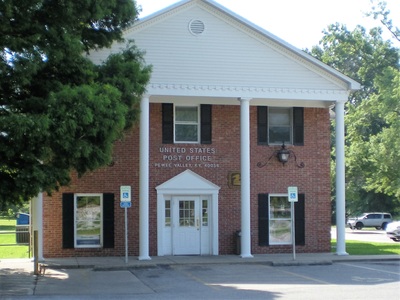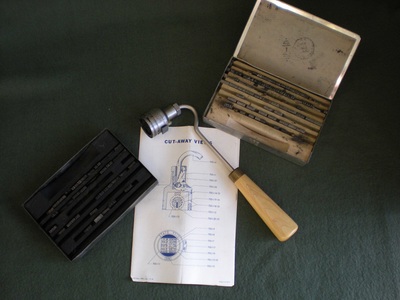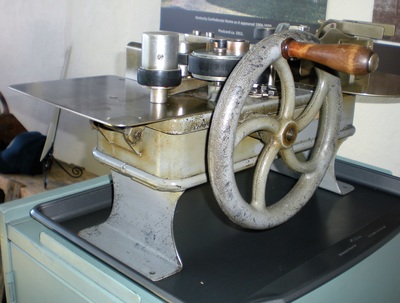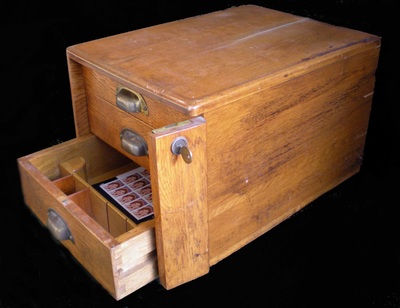Pewee Valley Post Office
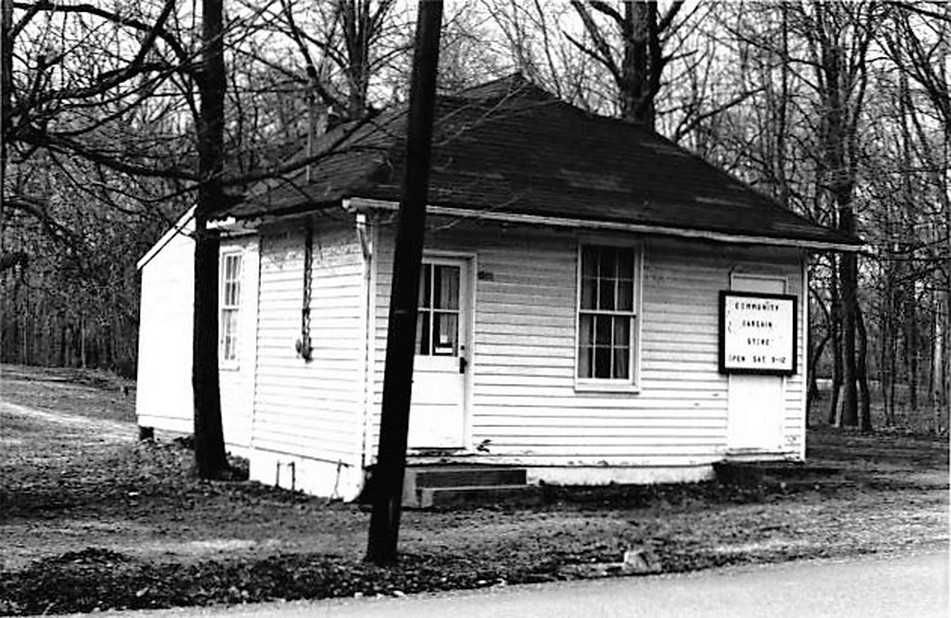
Built ca. 1890, this was the first structure constructed specifically to house the Pewee Valley Post Office. It was located behind the Woodruff-Foley Bros. store (now the Pewee Valley Vet) at 106 Central Avenue, and served as the town's post office into the 1950s. St. Aloysius Catholic Church used it for a time as a community bargain store, but demolished it in January, 1990, to expand their parking and create an entrance drive off Central Avenue. Photo from the 1981 Kentucky Historic Resources Inventory conducted by Carol Tobe.
Establishment of First Post Office
Records show a United States Post Office was first established at Pewee Valley, Kentucky on February 8, 1856. Charles F. Smith, the son of city father Henry Smith, was the town's first postmaster.
Residents were thrilled with their new post office and viewed it as important to their town's future prosperity and growth. "A Letter from Pewee Valley" written by "Violet" and dated February 22, 1956 appeared in the Louisville Morning Courier's Feb. 27 issue. In it, the anonymous correspondent described local reaction to the new post office:
...You have no idea, Messrs. Editors, what a flurry of excitement we were all in the other day, when it was announced in your paper that a Post-office had been established in Pewee, and that Pewee could boast of a Postmaster, a live Postmaster! I thought I should go crazy until I could get a sight of the Post-office and the Postmaster. So I went to the station, and there saw such a crowd of people as I had never seen before in Pewee. They were all discoursing about the Post-office, except some who reading the commission, some the bank bond to be filled up, and some the instructions to the appointee. Others were making valuable suggestions, such as pigeon holes to stow away the letters and papers &c. &c., and the construction of a letter box for drop letters, with which last suggestions I was much pleased, as nothing can be more delightful than a letter box, where one can drop one's letters to one's friends without it being known to everybody, who those friends are. The excitement has worn off considerably, and things are resuming their usual quiet course. I do not think the sensation was quite as intense, as is said sometimes to be produced by the receipt of unexpected or important news at the Royal Exchange, London, the Bourse, Paris, the Rialto, Venice, or even at the Board of Brokers, New York, but it was very great, I assure you...
Another letter from an anonymous correspondent appeared in the March 19, 1856 Louisville Democrat:
Habits, Manners and Customs of the Pewee Nation – Coaches, Doctors, Post Offices, Churches, etc., etc.
Pewee Valley, March 10, 1856
Messrs. Editors: This celebrated valley is situated on a ridge. It is about 16 miles from Louisville, on the railroad between Frankfort and that place. I will say nothing, of course, about the train leading to such an important place, it must be of the best order, and the genuine politeness of the conductors is well known to all who have ever travelled that road – they seem to be preparing you for the cordial reception you will meet when you arrive at Pewee. So much has been said of the various beauties and pleasures of this place, that my readers will have to excuse me if I fail to give them anything original. With this apology, I will proceed.
The place does not attract attention on account of its longstanding – for it has been but lately settled ...
... As you descend from the (railroad) cars, you find yourself upon a large platform, with a small white house before you. This is the station, store and post office of Pewee Valley. My heart swells with pride as a write the word POST OFFICE, as should every Peweean’s who is anxious for the prosperity of his country, home, village – I don’t know what to call it; for it is too small to be called CITY, and too important to be called village.
It is principally on account of this post office that I write this letter; for I think it is my duty to encourage the advancement of this place; and though my fingers tremble at the idea of these words appearing before the public, I still write on ...
On two occasions just prior to the outbreak of the Civil War in 1861, the Pewee Valley Post Office was discontinued for a short period of time and then reestablished. It has been serving Peweeans faithfully, with no breaks in service, since April 9, 1861.
Habits, Manners and Customs of the Pewee Nation – Coaches, Doctors, Post Offices, Churches, etc., etc.
Pewee Valley, March 10, 1856
Messrs. Editors: This celebrated valley is situated on a ridge. It is about 16 miles from Louisville, on the railroad between Frankfort and that place. I will say nothing, of course, about the train leading to such an important place, it must be of the best order, and the genuine politeness of the conductors is well known to all who have ever travelled that road – they seem to be preparing you for the cordial reception you will meet when you arrive at Pewee. So much has been said of the various beauties and pleasures of this place, that my readers will have to excuse me if I fail to give them anything original. With this apology, I will proceed.
The place does not attract attention on account of its longstanding – for it has been but lately settled ...
... As you descend from the (railroad) cars, you find yourself upon a large platform, with a small white house before you. This is the station, store and post office of Pewee Valley. My heart swells with pride as a write the word POST OFFICE, as should every Peweean’s who is anxious for the prosperity of his country, home, village – I don’t know what to call it; for it is too small to be called CITY, and too important to be called village.
It is principally on account of this post office that I write this letter; for I think it is my duty to encourage the advancement of this place; and though my fingers tremble at the idea of these words appearing before the public, I still write on ...
On two occasions just prior to the outbreak of the Civil War in 1861, the Pewee Valley Post Office was discontinued for a short period of time and then reestablished. It has been serving Peweeans faithfully, with no breaks in service, since April 9, 1861.
First Post Office Building
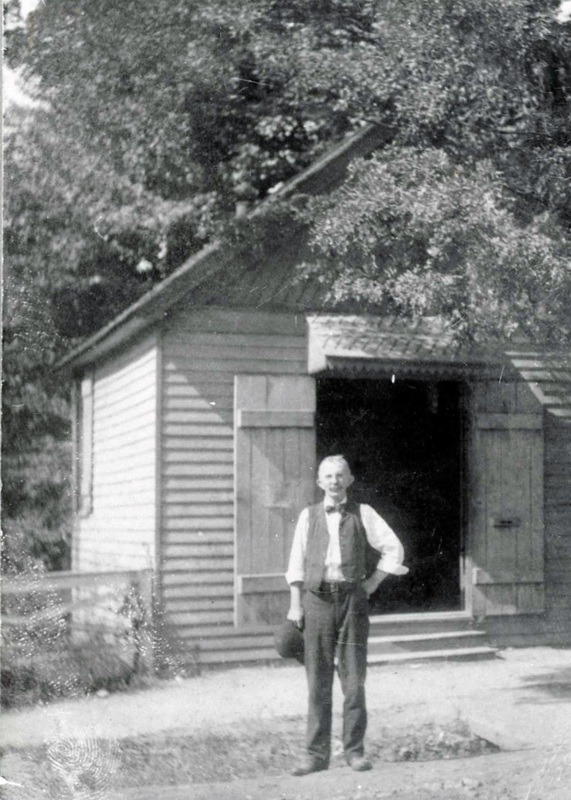
Postmaster Charles Calvert standing in front of the Pewee Valley Post Office in 1890. Courtesy of the late Pewee Valley Town Historian Virginia Herdt "Gin" Chaudoin. From "History & Families of Oldham County: 1824-1924," published by the Oldham County Historical Society (Turner Publishing, Paducah, Ky., 1996)
Though postal service was available to Peweeans before the Civil War, it wasn't until about 1890 that a separate Post Office building was constructed by the Foleys, who operated the meat market behind the Woodruff-Foley Bros. store. Before that time, the post office was located in the train depot and in W.N. Jurey's store (now the Little Colonel Playhouse).
In her autobiography, "Land of the Little Colonel," published in 1929, Annie Fellows Johnston described the building as it looked when it was first built:
"One had only to stroll past the little country post-office to feel the glamour of the place and meet a host of interesting characters. In those days the post-office was little more architecturally than a magnified dog kennel, but at nine o'clock of a summer morning it was the social centre for an animated half hour or more.
The smart equipages of summer residents were drawn up in front of it. Old family carryalls loaded with children in care of their black mammies joined the procession, and pretty girls and their escorts on horseback drew rein in the shade of the locusts arching the road.
One half expected to find "Mars' Chan" and "Meh Lady" among them, for the families represented here were sprung from the old Virginia stock and showed their birth and breeding both in feature and in charm of manner.
There was much visiting back and forth among the carriages while they waited. Picnics and parties were planned, invitations given and accepted, recipes exchanged and gossip passed from group to group."
"One had only to stroll past the little country post-office to feel the glamour of the place and meet a host of interesting characters. In those days the post-office was little more architecturally than a magnified dog kennel, but at nine o'clock of a summer morning it was the social centre for an animated half hour or more.
The smart equipages of summer residents were drawn up in front of it. Old family carryalls loaded with children in care of their black mammies joined the procession, and pretty girls and their escorts on horseback drew rein in the shade of the locusts arching the road.
One half expected to find "Mars' Chan" and "Meh Lady" among them, for the families represented here were sprung from the old Virginia stock and showed their birth and breeding both in feature and in charm of manner.
There was much visiting back and forth among the carriages while they waited. Picnics and parties were planned, invitations given and accepted, recipes exchanged and gossip passed from group to group."
Robberies at the Pewee Valley Post Office
The first post office building's "magnified dog kennel" design proved to be less than secure. Within its first decade, it was robbed twice.
On September 26, 1897, the Courier-Journal reported the post office had been robbed and the safe had been blown:
SAFE CRACKED
__________
Post Office at Pewee Valley
Robbed of $400
___________
Kit of Tools the Only Clew To
the Case
The residents of Pewee Valley were thrown into a state of excitement yesterday morning when it was learned the village post-office had been robbed the night before. The fact that the robbery had occurred was not known until the business people of Pewee Valley started to the depot to take the 7:30 train for the city. Mr. H.M. Woodruff, ex-postmaster of Pewee Valley, called at the local post-office this morning and informed assistant postmaster Tuley of the robbery. He said that the safe had been blown open sometime during the night and about $400 in money and stamps secured by the burglars.
The post office is in a small building several yards from any other house, and the noise of the explosion when the door was blown open was not heard. It is thought the work was done by professional burglars. A kit of blacksmith tools found by the safe is the only clew (sic) that may lead to the identification of the robbers.
Two hundred eighty dollars in money and $120 worth of postage stamps were taken from the safe. The post-office authorities at Washington were notified of the affair, and an inspector will be sent to investigate. Detective Latt Hitt, of LaGrange, was also sent for and is now looking into the case.
The Marshal of Pewee Valley says no strange men have been in the town for several days, and he is at a loss to know how the burglary was committed. Miss Mary Calvert is the postmistress at Pewee, and her brother, Charles Calvert, takes charge of the office for her. The post office has been the cause of considerable political discord. After the election of President McKinley an effort was made to retain Postmaster W.N. Jurey, but after a sharp contest Miss Calvert was appointed. The burglary is causing a great deal of excitement and gossip in the usually quiet village.
On September 26, 1897, the Courier-Journal reported the post office had been robbed and the safe had been blown:
SAFE CRACKED
__________
Post Office at Pewee Valley
Robbed of $400
___________
Kit of Tools the Only Clew To
the Case
The residents of Pewee Valley were thrown into a state of excitement yesterday morning when it was learned the village post-office had been robbed the night before. The fact that the robbery had occurred was not known until the business people of Pewee Valley started to the depot to take the 7:30 train for the city. Mr. H.M. Woodruff, ex-postmaster of Pewee Valley, called at the local post-office this morning and informed assistant postmaster Tuley of the robbery. He said that the safe had been blown open sometime during the night and about $400 in money and stamps secured by the burglars.
The post office is in a small building several yards from any other house, and the noise of the explosion when the door was blown open was not heard. It is thought the work was done by professional burglars. A kit of blacksmith tools found by the safe is the only clew (sic) that may lead to the identification of the robbers.
Two hundred eighty dollars in money and $120 worth of postage stamps were taken from the safe. The post-office authorities at Washington were notified of the affair, and an inspector will be sent to investigate. Detective Latt Hitt, of LaGrange, was also sent for and is now looking into the case.
The Marshal of Pewee Valley says no strange men have been in the town for several days, and he is at a loss to know how the burglary was committed. Miss Mary Calvert is the postmistress at Pewee, and her brother, Charles Calvert, takes charge of the office for her. The post office has been the cause of considerable political discord. After the election of President McKinley an effort was made to retain Postmaster W.N. Jurey, but after a sharp contest Miss Calvert was appointed. The burglary is causing a great deal of excitement and gossip in the usually quiet village.
Three years later the Courier-Journal reported a second break-in the evening of December 26, 1900. This time, the safe wasn't cracked when "amateur" thieves broke open the doors. They only managed to abscond with about 50 cents worth of stamps.
The Calvert Rein over the Pewee Valley Post Office
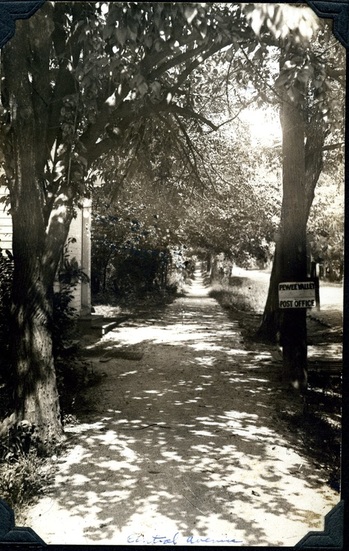 "Beaten Path to the Post Office" by Kate Matthews. Courtesy of the late B. Utley Murphy.
"Beaten Path to the Post Office" by Kate Matthews. Courtesy of the late B. Utley Murphy.
Until 1971, when the Post Office Department became an independent agency of the executive branch of government, postal appointments were made by the President of the United States. They were often very political and could be hotly contested.
Both H.M. Woodruff and W.N. Jurey must have laughed up their sleeves about the 1897 robbery. At different times, Charles Calvert had ousted them both from the postmaster position, Woodruff in 1889, after serving 18 years; and Jurey in 1897, after serving four.
The Calverts, who lived on Maple Avenue, were extremely well-connected politically. Joseph Calvert had been a bigwig in the Republican Party since 1856, and wasn't bashful about using his contacts to further his children's careers. Two of his three children served as postmaster between 1889 and 1914: Charles Asher Calvert (1889-1893 and 1907- 1914); and Mary Calvert (1897-1907). The June 13, 1897 Courier-Journal covered the behind-the-scenes wheeling and dealing that gave the Calvert kids dominion over the post office for nearly a quarter of a century:
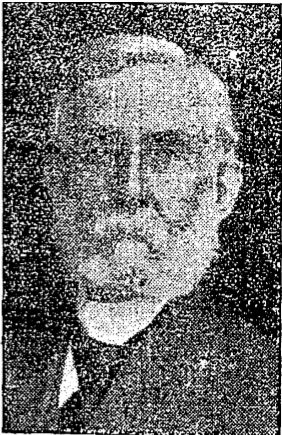 Joseph W. Calvert, from the Courier-Journal, March 7, 1909
Joseph W. Calvert, from the Courier-Journal, March 7, 1909
BICKERINGS
____________
Among Republicans Over the
Distribution of Pie
________________
A PIE TRUST DISCOVERED
________________
And Its Factors Duly Roasted
By the Frankfort Capital
________________
JUDGE DENNY AS A BOSS
________________
Using Seventh District Pat-
ronage to Even
Old Scores
________________
THE PEWEE POST OFFICE Frankfort, Ky., June 12. -- (Special) -- The friction in Republican circles over the pie distribution is beginning to generate heat. The Frankfort Capital tomorrow will publish the following:
"If reports from Washington are to be believed, the Kentucky Pie Trust is playing President McKinley for the rankest sucker ever known. It is gravely announced that the Trust has selected this man to fill the office in one district and that man to be the sole boss of another district, and when someone expresses surprise that such men as were unfriendly to McKinley's interest and otherwise of no political account, should be recognized in so marked a manner, the answer is given that it makes no difference about McKinley or the Republican party, so long as the men are wanted by some member of the Pie Trust.
"The most striking illustration of the nerve of the self-constituted guardians of the Republican party, is to be found in the proposition to recognize Judge George Denny, of Lexington, as the official representative of the Seventh district. It is supposed that Judge Denny claims this authority because three years ago he ran for Congress and could not command his own party vote. But C.M. Barnett who lives near Senator Deboe, has indorsed Denny for boss in the Seventh and Senator Deboe being a little tired of carrying the whole State of Kentucky around on his shoulders, has told Barnett to 'go to the White House and tell Mac to leave them there Seventh deestrickt post-offices to Denny.'
"And now that the Pie Trust has agreed to put Denny in charge of the district, he is going in for revenge on those who supported the Republican ticket. As stated all but one of the Seventh District Committee were for Breckinridge, and that was J.W. Calvert, the chairman of the Oldham County Committee. Calvert bolted Breckinridge's nomination and went to work for Settle. He worked hard to get the negroes to vote for Settle, and the writer was wired by Chairman Sam Roberts to go to work to counteract the treachery of Calvert, who instructed the telegraph operator at Pewee Valley not to deliver him any more telegrams from Roberts. On election day Calvert worked openly at the polls for Settle and his son did not vote at all. This son is now an applicant for the place of postmaster at Pewee Valley and is indorsed by Judge Denny.
"Judge J.M. Armstrong, of Pewee Valley, last week wrote to Judge Denny protesting against young Calvert's appointment on the political grounds mentioned, and also on the grounds that charges were made against young Calvert in connection with his former conduct of this office. The charges were of a character as to render his appointment very improbable if substantiated. But Judge Denny's reply was in his usual winning style. He said that he did not know anything about what was alleged against young Calvert, in fact, did not even know him, but his father, J.W. Calvert, was Denny's friend and he proposed to stand by him, and he added further in the most graceful manner that he did not care if the appointment suited anybody or not; it suited him...."
What misconduct Calvert was accused of during his first appointment as postmaster is unknown, but the May 7, 1891 Courier-Journal reported that C.A. Calvert had been removed as postmaster and L.B. Armstrong appointed. Postmasters who left the office for political reasons were generally listed as "resigned" rather than "removed." Though reported in the newspaper, L.B. Armstrong's name does not appear in the official postmaster records kept by the U.S. Postal Service.
To sidestep the misconduct issue, his sister Mary Calvert was appointed postmaster on June 25, 1897, and Charles served in her stead. In 1907, he was officially re-appointed to the position, which paid $707 a year, according to "Official Register of the United States, Volume 2." Presumably, that was the year his sister got married and moved to Illinois. Calvert maintained a lock on the position until 1914, despite the death of his father, Joseph, in 1909. Joseph's obituary, which ran in the March 7, 1909 Courier-Journal, shows just how high-reaching his ties with the Republican party were:
____________
Among Republicans Over the
Distribution of Pie
________________
A PIE TRUST DISCOVERED
________________
And Its Factors Duly Roasted
By the Frankfort Capital
________________
JUDGE DENNY AS A BOSS
________________
Using Seventh District Pat-
ronage to Even
Old Scores
________________
THE PEWEE POST OFFICE Frankfort, Ky., June 12. -- (Special) -- The friction in Republican circles over the pie distribution is beginning to generate heat. The Frankfort Capital tomorrow will publish the following:
"If reports from Washington are to be believed, the Kentucky Pie Trust is playing President McKinley for the rankest sucker ever known. It is gravely announced that the Trust has selected this man to fill the office in one district and that man to be the sole boss of another district, and when someone expresses surprise that such men as were unfriendly to McKinley's interest and otherwise of no political account, should be recognized in so marked a manner, the answer is given that it makes no difference about McKinley or the Republican party, so long as the men are wanted by some member of the Pie Trust.
"The most striking illustration of the nerve of the self-constituted guardians of the Republican party, is to be found in the proposition to recognize Judge George Denny, of Lexington, as the official representative of the Seventh district. It is supposed that Judge Denny claims this authority because three years ago he ran for Congress and could not command his own party vote. But C.M. Barnett who lives near Senator Deboe, has indorsed Denny for boss in the Seventh and Senator Deboe being a little tired of carrying the whole State of Kentucky around on his shoulders, has told Barnett to 'go to the White House and tell Mac to leave them there Seventh deestrickt post-offices to Denny.'
"And now that the Pie Trust has agreed to put Denny in charge of the district, he is going in for revenge on those who supported the Republican ticket. As stated all but one of the Seventh District Committee were for Breckinridge, and that was J.W. Calvert, the chairman of the Oldham County Committee. Calvert bolted Breckinridge's nomination and went to work for Settle. He worked hard to get the negroes to vote for Settle, and the writer was wired by Chairman Sam Roberts to go to work to counteract the treachery of Calvert, who instructed the telegraph operator at Pewee Valley not to deliver him any more telegrams from Roberts. On election day Calvert worked openly at the polls for Settle and his son did not vote at all. This son is now an applicant for the place of postmaster at Pewee Valley and is indorsed by Judge Denny.
"Judge J.M. Armstrong, of Pewee Valley, last week wrote to Judge Denny protesting against young Calvert's appointment on the political grounds mentioned, and also on the grounds that charges were made against young Calvert in connection with his former conduct of this office. The charges were of a character as to render his appointment very improbable if substantiated. But Judge Denny's reply was in his usual winning style. He said that he did not know anything about what was alleged against young Calvert, in fact, did not even know him, but his father, J.W. Calvert, was Denny's friend and he proposed to stand by him, and he added further in the most graceful manner that he did not care if the appointment suited anybody or not; it suited him...."
What misconduct Calvert was accused of during his first appointment as postmaster is unknown, but the May 7, 1891 Courier-Journal reported that C.A. Calvert had been removed as postmaster and L.B. Armstrong appointed. Postmasters who left the office for political reasons were generally listed as "resigned" rather than "removed." Though reported in the newspaper, L.B. Armstrong's name does not appear in the official postmaster records kept by the U.S. Postal Service.
To sidestep the misconduct issue, his sister Mary Calvert was appointed postmaster on June 25, 1897, and Charles served in her stead. In 1907, he was officially re-appointed to the position, which paid $707 a year, according to "Official Register of the United States, Volume 2." Presumably, that was the year his sister got married and moved to Illinois. Calvert maintained a lock on the position until 1914, despite the death of his father, Joseph, in 1909. Joseph's obituary, which ran in the March 7, 1909 Courier-Journal, shows just how high-reaching his ties with the Republican party were:
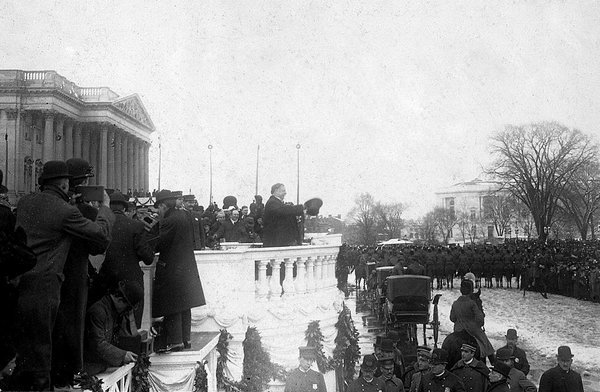 Taft inauguration in Washington, D.C., on March 4, 1909
Taft inauguration in Washington, D.C., on March 4, 1909
EN ROUTE HOME.
_____________
Joseph W. Calvert Succumbs
To Pneumonia
__________________
MEMBER OF BRADLEY PARTY AT
INAUGURATION
ATTENDED EVERY SIMILAR
FUNCTION SINCE 1856
_______________________
WAS LIFELONG REPUBLICAN
Joseph W. Calvert, one of the members of the Kentucky delegation who went to Washington to witness the inauguration of President Taft, died of acute senile pneumonia en route to Louisville on the Bradley special train, which left Washington Friday afternoon. A telegram announcing his death, which was received here shortly before noon yesterday, stated that his death had occurred suddenly at 10 o'clock yesterday morning. The telegram was sent by Dr. Ben L. Bruner, Secretary of State, and was dated at Hinton, W. Va.
... Mr. Calvert was 82 years of age. He was born at Nashville, Tenn., and was the son of Rev. Thomas Calvert, a Presbyterian minister. He received his education at a Presbyterian institution in Virginia. At the age of ten years, he removed with his parents to Bowling Green, Ky., and there, after he had attained manhood, was a merchant until the close of the Civil War, when he came to Louisville. For several years Mr. Calvert was President of the Bennett Bros. Furniture Manufacturing Company, and later became one of the associate editors of the old Louisville Journal. At one time he was a member of the firm of the Kentucky Bell Foundry Company of Louisville. For more than forty years until about fourteen years ago, Mr. Calvert was engaged actively in business, when he retired and made his home at Pewee Valley. Throughout his long life he has taken a deep interest in public affairs, and although never a candidate for office, having declined many public appointive positions, he was a politician. Mr. Calvert was an old line Whig.
_____________
Joseph W. Calvert Succumbs
To Pneumonia
__________________
MEMBER OF BRADLEY PARTY AT
INAUGURATION
ATTENDED EVERY SIMILAR
FUNCTION SINCE 1856
_______________________
WAS LIFELONG REPUBLICAN
Joseph W. Calvert, one of the members of the Kentucky delegation who went to Washington to witness the inauguration of President Taft, died of acute senile pneumonia en route to Louisville on the Bradley special train, which left Washington Friday afternoon. A telegram announcing his death, which was received here shortly before noon yesterday, stated that his death had occurred suddenly at 10 o'clock yesterday morning. The telegram was sent by Dr. Ben L. Bruner, Secretary of State, and was dated at Hinton, W. Va.
... Mr. Calvert was 82 years of age. He was born at Nashville, Tenn., and was the son of Rev. Thomas Calvert, a Presbyterian minister. He received his education at a Presbyterian institution in Virginia. At the age of ten years, he removed with his parents to Bowling Green, Ky., and there, after he had attained manhood, was a merchant until the close of the Civil War, when he came to Louisville. For several years Mr. Calvert was President of the Bennett Bros. Furniture Manufacturing Company, and later became one of the associate editors of the old Louisville Journal. At one time he was a member of the firm of the Kentucky Bell Foundry Company of Louisville. For more than forty years until about fourteen years ago, Mr. Calvert was engaged actively in business, when he retired and made his home at Pewee Valley. Throughout his long life he has taken a deep interest in public affairs, and although never a candidate for office, having declined many public appointive positions, he was a politician. Mr. Calvert was an old line Whig.
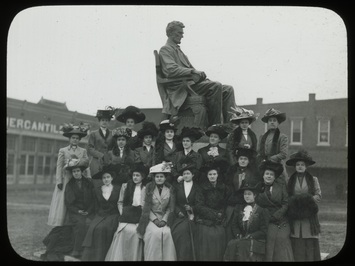 1909 photo of women surrounding the Lincoln statue in Hodgenville, Ky. From the James Hare Lantern Slides collection at the Mammoth Cave National Park.
1909 photo of women surrounding the Lincoln statue in Hodgenville, Ky. From the James Hare Lantern Slides collection at the Mammoth Cave National Park.
Friend of Lincoln
He was a close friend of Abraham Lincoln and attended the ceremonies at the Lincoln Farm in Hodgenville February 11. On that occasion, he was a delegate on Gov. Willson's staff. Mr. Calvert was also acquainted with President Grant, knew President Taft personally, and was an intimate of Senator Bradley.
Mr. Calvert is survived by one son, Charles A. Calvert, postmaster of Pewee Valley, and two daughters, Mrs. Mary C. Strong and Miss Clara Calvert, both of Joliet, Ill...
He was a close friend of Abraham Lincoln and attended the ceremonies at the Lincoln Farm in Hodgenville February 11. On that occasion, he was a delegate on Gov. Willson's staff. Mr. Calvert was also acquainted with President Grant, knew President Taft personally, and was an intimate of Senator Bradley.
Mr. Calvert is survived by one son, Charles A. Calvert, postmaster of Pewee Valley, and two daughters, Mrs. Mary C. Strong and Miss Clara Calvert, both of Joliet, Ill...
On April 29, 1914, the Courier-Journal reported that Charles Calvert had lost the patronage post and his neighbor on Ashwood Avenue, Mrs. Ella Swan, was appointed. The Calvert rein over the Pewee Valley Post Office was officially at an end -- 31 years after the political spoils system allowing presidents to award federal jobs to their political supporters supposedly ended:
CALVERT'S CABINET PULL
NOT STRONG ENOUGH
____________________________________
Mrs. Ella Swan Appointed Post-
Master at Pewee Valley on Can-
trill's Recommendation
Washington, April 24. --(Special) -- With the appointment to-day of Mrs. Ella Swan to be postmaster of Pewee Valley, Representative J.C. Cantrill settled a troublesome patronage matter that has given him no little concern. Charles M. (sic) Calvert, Republican, who has been postmaster of that town for many years, was anxious to be retained in office, and he brought a great deal of powerful political pressure to bear. Secretaries Bryan and Daniels, urged by the Rev. Peyton Hoge, of Louisville, went to the front for him. By the co-operation of Senator James and Representatives Swagar Sherley and A.B. Rouse, each of whom urged the Postmaster General to indorse (sic) the recommendation of Mr. Cantrill, the several difficulties were ironed out and Mrs. Swan received the appointment over the influence of the two Cabinet officers.
Rev. Hoge had moved to Pewee Valley in 1907 and may not have known about the previous scandal when he went to bat for him. The fact that Calvert's grandfather had been a Presbyterian minister may also have been a factor in the Rev. Hoge's support.
CALVERT'S CABINET PULL
NOT STRONG ENOUGH
____________________________________
Mrs. Ella Swan Appointed Post-
Master at Pewee Valley on Can-
trill's Recommendation
Washington, April 24. --(Special) -- With the appointment to-day of Mrs. Ella Swan to be postmaster of Pewee Valley, Representative J.C. Cantrill settled a troublesome patronage matter that has given him no little concern. Charles M. (sic) Calvert, Republican, who has been postmaster of that town for many years, was anxious to be retained in office, and he brought a great deal of powerful political pressure to bear. Secretaries Bryan and Daniels, urged by the Rev. Peyton Hoge, of Louisville, went to the front for him. By the co-operation of Senator James and Representatives Swagar Sherley and A.B. Rouse, each of whom urged the Postmaster General to indorse (sic) the recommendation of Mr. Cantrill, the several difficulties were ironed out and Mrs. Swan received the appointment over the influence of the two Cabinet officers.
Rev. Hoge had moved to Pewee Valley in 1907 and may not have known about the previous scandal when he went to bat for him. The fact that Calvert's grandfather had been a Presbyterian minister may also have been a factor in the Rev. Hoge's support.
What Became of the Calverts After Charles Lost the Postmaster Position
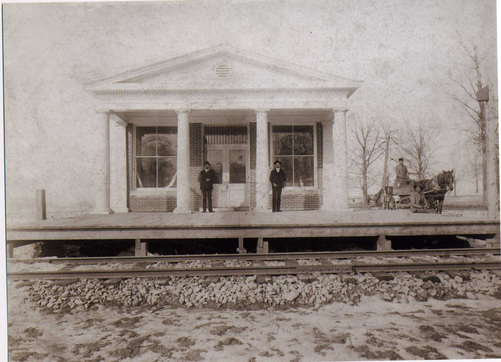 The store at O'Bannons, where Charles Calvert was working in 1917.
The store at O'Bannons, where Charles Calvert was working in 1917.
Charles Calvert was involved in a number of efforts to improve Pewee Valley, in addition to his career at the Post Office. In 1907, he became Secretary/Treasurer of the Pewee Valley Cemetery. In 1910, he served on the first Board of Directors of the Pewee Valley State Bank,
On November 26, 1917, his father's old home on Maple, where he lived with his wife Hallie, burned. Described by the Courier-Journal as "a two-story frame residence" and "one of the landmarks of Pewee Valley," the house and a number of outbuildings were destroyed at an estimated loss of $4,000. By that time, he had been forced to find other employment and was working at the O'Bannon store near Pewee.
By 1920, he and his wife had moved to a house on Central Avenue at Rollington near the Herdts and he was working as a clerk at the Mengel Box Company in Louisville. His wife died in 1930 and by the 1930 census, he was living alone at a home on Saint Catherine Street in Louisville and working as a buyer in the automotive business. He died on December 1, 1934 and is buried at Cave Hill Cemetery.
On November 26, 1917, his father's old home on Maple, where he lived with his wife Hallie, burned. Described by the Courier-Journal as "a two-story frame residence" and "one of the landmarks of Pewee Valley," the house and a number of outbuildings were destroyed at an estimated loss of $4,000. By that time, he had been forced to find other employment and was working at the O'Bannon store near Pewee.
By 1920, he and his wife had moved to a house on Central Avenue at Rollington near the Herdts and he was working as a clerk at the Mengel Box Company in Louisville. His wife died in 1930 and by the 1930 census, he was living alone at a home on Saint Catherine Street in Louisville and working as a buyer in the automotive business. He died on December 1, 1934 and is buried at Cave Hill Cemetery.
The Post Office's Later History
At some point before 1927, the post office was remodeled with a large addition on the front that included two doors and a central window. In October 1932, photographer Kate Matthews captured a group of Peweeans outside the remodeled post office for the photo post card above. On the back is a limerick, which identifies the people in the photo, written by her niece, Fliss Gutenberger:
O'er hill and dale
They came for the mail.
This seems to be quite a sally.
Virginia and Lotta and Dr. Hoge too
Mamie, Donald and Hallie
And pray who is this?
It's Babes and there Fliss.
They all love to dilly and dally.
They chatter of this
And they chatter of that,
These Peweezers of Pewee Valley.
They came for the mail.
This seems to be quite a sally.
Virginia and Lotta and Dr. Hoge too
Mamie, Donald and Hallie
And pray who is this?
It's Babes and there Fliss.
They all love to dilly and dally.
They chatter of this
And they chatter of that,
These Peweezers of Pewee Valley.
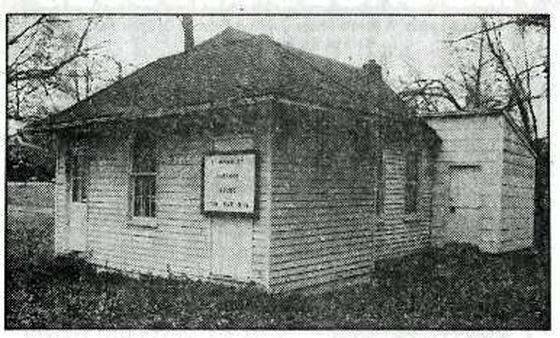 The first post office as it appeared in 1989, shortly before demolition. The lean-to addition on back was an indoor privy. The building never had plumbing -- a vicissitude Pewee Valley's postal employees dealt with every day, summer and winter.
The first post office as it appeared in 1989, shortly before demolition. The lean-to addition on back was an indoor privy. The building never had plumbing -- a vicissitude Pewee Valley's postal employees dealt with every day, summer and winter.
The original post office building was abandoned in the 1950s. In the 1980s, St. Aloysius Catholic Church used it as a clothing shop for the poor.
When the church decided to construct an entrance to their property off Central Avenue, they offered to give the building away to anyone willing to move it. It had no plumbing or heat and had suffered extensive termite damage.
There were no takers. In January 1990, it was torn down to make way for Eberle Avenue.
The post office moved several times before arriving at its present location on LaGrange Road. It was housed for some years in Beard's Grocery, which was first located in what is now the Little Colonel Playhouse. In 1962, Beard's moved to a new strip center across the tracks at 311 LaGrange Road, and the post office followed in 1965. (Editor's note: The center is occupied by a podiatrist and physical therapy office today.) An article about the move ran in the February 9, 1965 Courier-Journal:
The Pewee Valley Post Office will be moved to a new and larger quarters at 311 KY 146 in the near future, the Post Office Department announced today.
The one-story, air-conditioned building will be leased for five-years from Charles S. Beard and Thelma N. Beard, Pewee Valley. The lease agreement has renewal options running up to 15 years.
In the fall of 1968, the L&N quit delivering Pewee Valley's mail by rail, when the United States Postal Service switched to trucks in this area. By August 1970, the majority of Peweeans were able to get home mail delivery -- many for the first time, according to the August 1970 Call of the Pewee:
Home mail delivery service will be available to nearly all Pewees via a new rural route under the administrative control of the Crestwood Post Office, beginning Saturday, August 22.
...Crestwood up to now had had two rural routes, which together ... covered a good portion of Pewee Valley.
But the two routes have become overloaded, so it was necessary to split service into three routes, and it is R.R. 3 which will now serve our town.
Streets and areas in Pewee Valley which now can have delivery service for the first time include: Elm, LaGrange Road west of Ash; Wooldridge, and Tuliphurst Subdivision. (Adjacent to the city limits, new areas for home delivery include Clovercroft Subdivision and the Pewee Valley Hospital area.)
This leaves Tulip Avenue and Old Forest Road as the only city streets without delivery service. The Crestwood Post Office says that deliveries can be extended to Old Forest Road if a majority want it ...
Mrs. Betty Thompson Swinney, a former Pewee now living in Crestwood, will be the Route 3 carrier. The route is planned as a morning run, but delays are anticipated at first, before the bugs are worked out.
The Pewee Valley Post Office will be moved to a new and larger quarters at 311 KY 146 in the near future, the Post Office Department announced today.
The one-story, air-conditioned building will be leased for five-years from Charles S. Beard and Thelma N. Beard, Pewee Valley. The lease agreement has renewal options running up to 15 years.
In the fall of 1968, the L&N quit delivering Pewee Valley's mail by rail, when the United States Postal Service switched to trucks in this area. By August 1970, the majority of Peweeans were able to get home mail delivery -- many for the first time, according to the August 1970 Call of the Pewee:
Home mail delivery service will be available to nearly all Pewees via a new rural route under the administrative control of the Crestwood Post Office, beginning Saturday, August 22.
...Crestwood up to now had had two rural routes, which together ... covered a good portion of Pewee Valley.
But the two routes have become overloaded, so it was necessary to split service into three routes, and it is R.R. 3 which will now serve our town.
Streets and areas in Pewee Valley which now can have delivery service for the first time include: Elm, LaGrange Road west of Ash; Wooldridge, and Tuliphurst Subdivision. (Adjacent to the city limits, new areas for home delivery include Clovercroft Subdivision and the Pewee Valley Hospital area.)
This leaves Tulip Avenue and Old Forest Road as the only city streets without delivery service. The Crestwood Post Office says that deliveries can be extended to Old Forest Road if a majority want it ...
Mrs. Betty Thompson Swinney, a former Pewee now living in Crestwood, will be the Route 3 carrier. The route is planned as a morning run, but delays are anticipated at first, before the bugs are worked out.
While home delivery was certainly more convenient, Peweeans feared that having the Crestwood Post Office deliver their mail spelled doom for their own post office and separate postal identity. So they banded together and started a Save Our Post Office movement, led by Postmaster Mackey Fletcher. The August 1970 Call of the Pewee reported:
... Home delivery is not legally possible from the Pewee Valley Post Office at this time. Delivery is not authorized in towns of less than 2,500 persons.
The Pewee valley Post Office has tried, under various postmasters, to establish delivery service for those patrons who wanted it. But such petitions have been denied on grounds that such service was available on Crestwood rural routes.
Pewee Valley Postmaster Matthews Fletcher says that there is hope that the Postal Reform Bill which was signed into law this month by President Richard Nixon will make it possible for small towns to have efficient, responsive and economically reasonable delivery service -- but that this will happen for Pewee Valley only if our residents show determination.
One way for individuals to show their feelings on this is to write to Rep. Gene Snyder ... Members of the Pewee Valley Woman's Club have been urging residents to do this on an individual basis.
In the meantime, after hearing from Mr. Fletcher an appraisal of the local postal problem, the City Council has written him a letter signed by the mayor, councilmen, city clerk-treasurer and police chief urging "you and your superiors in the Post Office Department to work on the establishment of postal service that will be responsive to the peculiar needs of Pewee Valley, adequate for the present and capable of expanding to accommodate the growth that is coming."
The letter, pointing to the present construction activity in town and the immediate vicinity, goes on to say: "We are the only incorporated city within a 10-mile radius which has a Post Office within its city limits; consequently, undoubtedly, further expansive programs by the Post Office Department should originate from the Post Office within our city limits."
An attached petition supporting the recommendations of city council has been signed by hundreds of Pewees.
Mr. Fletcher will forward the letter and petition to the regional postal authorities.
... Home delivery is not legally possible from the Pewee Valley Post Office at this time. Delivery is not authorized in towns of less than 2,500 persons.
The Pewee valley Post Office has tried, under various postmasters, to establish delivery service for those patrons who wanted it. But such petitions have been denied on grounds that such service was available on Crestwood rural routes.
Pewee Valley Postmaster Matthews Fletcher says that there is hope that the Postal Reform Bill which was signed into law this month by President Richard Nixon will make it possible for small towns to have efficient, responsive and economically reasonable delivery service -- but that this will happen for Pewee Valley only if our residents show determination.
One way for individuals to show their feelings on this is to write to Rep. Gene Snyder ... Members of the Pewee Valley Woman's Club have been urging residents to do this on an individual basis.
In the meantime, after hearing from Mr. Fletcher an appraisal of the local postal problem, the City Council has written him a letter signed by the mayor, councilmen, city clerk-treasurer and police chief urging "you and your superiors in the Post Office Department to work on the establishment of postal service that will be responsive to the peculiar needs of Pewee Valley, adequate for the present and capable of expanding to accommodate the growth that is coming."
The letter, pointing to the present construction activity in town and the immediate vicinity, goes on to say: "We are the only incorporated city within a 10-mile radius which has a Post Office within its city limits; consequently, undoubtedly, further expansive programs by the Post Office Department should originate from the Post Office within our city limits."
An attached petition supporting the recommendations of city council has been signed by hundreds of Pewees.
Mr. Fletcher will forward the letter and petition to the regional postal authorities.
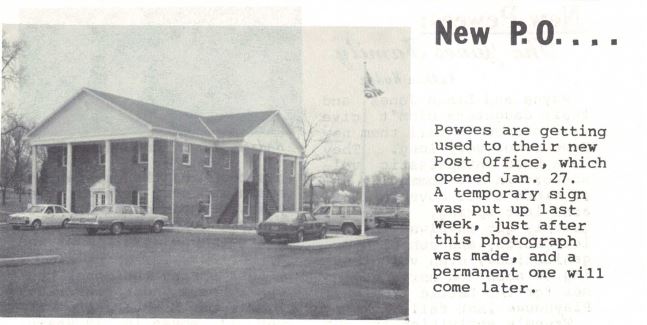 The present Pewee Valley Post Office as it appeared when it opened in 1986. From the February 1986 Call of the Pewee.
The present Pewee Valley Post Office as it appeared when it opened in 1986. From the February 1986 Call of the Pewee.
The protest seems to have worked. And just as predicted, the town's population grew. By 1985, the building at 311 LaGrange Road was too small and there wasn't enough space to accommodate the number of post office boxes residents requested. Finding a suitable location for a new building, however, was a challenge. This story from the June 1985 Call of the Pewee tells the tale:
Whither Our Post Office?
First there was a hassle over the proposed relocation of the Pewee Valley Post Office beyond the west city limits, either completely or partially in Jefferson County.
Then when a central location right next door to the present one became available, there was hassle over some possible drainage problems there.
But now, at last, the Post Office has found its new home -- at the next-door location on a portion of the John Bishop property.
The ground has been cleared, and construction of a two-story building -- Post Office on the ground floor, and commercial space above -- is imminent.
The brick structure will measure 34 by 64 feet, with about 2,000 square feet per floor. It will be set back 90 feet from LaGrange Road.
There will be two entrances to the park area, one off the road and the other a direct connection with the present parking area at the front of the Post Office and Beard's Grocery.
The new Post Office will have 2-1/2 times box space now available -- a considerable improvement over the area now shared by the Post Office, grocery store and gasoline station.
On April 23 (1985), developer Bob Jones of Crestwood got approval from the Oldham County Planning & Zoning Commission for the required zoning change on the property. The commission then recommended this to the Pewee Valley City Council for final action.
About 75 residents showed up at a special meeting of the Council on May 13, and after considerable discussion -- with 17 persons speaking out pro and six con -- the Council voted unanimously to accept the Planning & Zoning Commission's recommendation.
The recommendation stated that the zoning change from R1-A (large tract residential) to C-1 (local business) be approved, thus allowing the new construction, "providing that Mr. Jones lower the culvert under the sidewalk, see to it that the blockage at Herdt's garage is opened, and work with the City of Pewee Valley to try to correct the other existing drainage problems in the area."
The general feeling among residents who spoke at the Council meeting appeared to be that the need for a central location for the Post Office outweighed concern over possible drainage problems.
The Pewee Valley Post Office History in Photos
Pewee Valley Postmasters
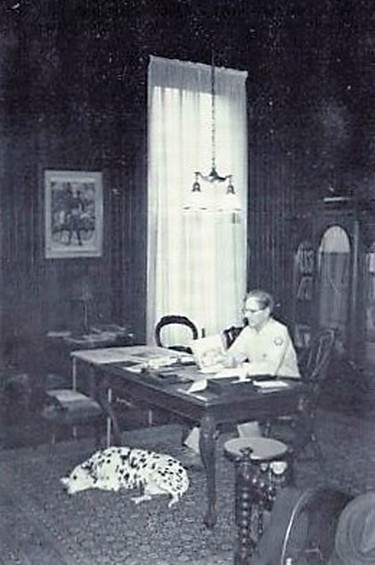 Matthews Fletcher wearing his postmaster uniform at his home, Peace Farm, from the April 1975 Call of the Pewee. "Mackey" was the last postmaster to be appointed by the President and served for 19 years.
Matthews Fletcher wearing his postmaster uniform at his home, Peace Farm, from the April 1975 Call of the Pewee. "Mackey" was the last postmaster to be appointed by the President and served for 19 years.
The following list of Pewee Valley postmasters and their dates of appointment is courtesy of Pewee Valley Postmaster Andrea L. Braden:
Charles F. Smith February 8, 1856
Francis McGraw August 28, 1856
Samuel H. Crum November 23, 1858*
Thomas Smith November 23, 1858
POST OFFICE DISCONTINUED FEBRUARY 15, 1861
POST OFFICE REESTABLISHED MARCH 1, 1861
Thomas Smith March 1, 1861*
William A. Hudson April 9, 1861
William Butler November 8, 1861*
POST OFFICE DISCONTINUED NOVEMBER 2, 1861
POST OFFICE REESTABLISHED NOVEMBER 26 1861
Luther Howard November 26, 1861
William J. White July 3, 1866
Henry M. Woodruff February 13, 1871
Charles A. Calvert September 9, 1889
William N. Jurey May 1, 1893
Charles A. Calvert June 21, 1897*
Mary Calvert June 25, 1897
Charles A. Calvert July 16, 1907
Ella H. Swann April 25, 1914
Anna B. Lipscomb March 5, 1919
Mrs. Anna D. Shelman November 4, 1920
Charles F. Smith February 8, 1856
Francis McGraw August 28, 1856
Samuel H. Crum November 23, 1858*
Thomas Smith November 23, 1858
POST OFFICE DISCONTINUED FEBRUARY 15, 1861
POST OFFICE REESTABLISHED MARCH 1, 1861
Thomas Smith March 1, 1861*
William A. Hudson April 9, 1861
William Butler November 8, 1861*
POST OFFICE DISCONTINUED NOVEMBER 2, 1861
POST OFFICE REESTABLISHED NOVEMBER 26 1861
Luther Howard November 26, 1861
William J. White July 3, 1866
Henry M. Woodruff February 13, 1871
Charles A. Calvert September 9, 1889
William N. Jurey May 1, 1893
Charles A. Calvert June 21, 1897*
Mary Calvert June 25, 1897
Charles A. Calvert July 16, 1907
Ella H. Swann April 25, 1914
Anna B. Lipscomb March 5, 1919
Mrs. Anna D. Shelman November 4, 1920
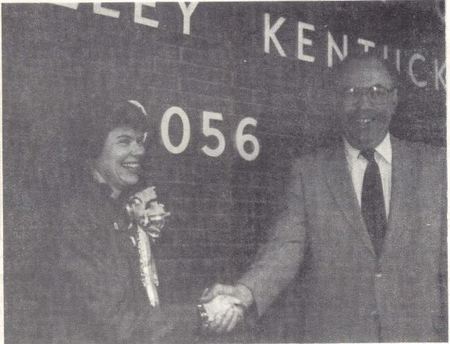 Dorothy "D.D." Gehlbach Hendrickson accepting the position of Pewee Valley Postmaster. She served for 18 years. Photo from the March 1983 Call of the Pewee.
Dorothy "D.D." Gehlbach Hendrickson accepting the position of Pewee Valley Postmaster. She served for 18 years. Photo from the March 1983 Call of the Pewee.
Charles W. Robinson, Jr. February 22, 1922
Mrs. Minnie O. Tschiffley May 23, 1924
Inez Hancock July 6, 1928**
Mrs. Anna D. Shelman March 30, 1930
Charles W. Robinson February 24 1931
Mrs. Imogene Baumeister August 28, 1934**
Mrs. Imogene Baumeister July 2, 1935***
Mrs. Emma B. Hardin February 25, 1944**
Mrs. Cornelia L. Snyder December 2, 1944
Mrs. Jeanne F. Wilson June 30, 1961****
Charles M. Thompson April 16, 1962**
Matthews Fletcher June 17, 1963
Edwin A. Hart, Jr. October 8, 1982**
Dorothy E. Gehlbach February 19, 1983*****
Susan E. Jensen June 20, 2001**
Susan E. Jensen August 11, 2001
Sandra L. Deapen December 17, 2002**
Randalene R. Cross March 8, 2003
Andrea L. Braden January 9, 2013**
Andrea L. Braden September 7, 2013
* May not have served
**Acting Postmaster, later called Officer-In-Charge
***Mrs. Imogene Baumeister's surname changed by marriage to Kilgus on December 24, 1943
****Mrs. Jeanne F. Wilson's surname changed by marriage to Huntley on January 27, 1962
*****Dorothy E. Gehlbach's surname changed by marriage to Hendrickson (date unavailable)
Mrs. Minnie O. Tschiffley May 23, 1924
Inez Hancock July 6, 1928**
Mrs. Anna D. Shelman March 30, 1930
Charles W. Robinson February 24 1931
Mrs. Imogene Baumeister August 28, 1934**
Mrs. Imogene Baumeister July 2, 1935***
Mrs. Emma B. Hardin February 25, 1944**
Mrs. Cornelia L. Snyder December 2, 1944
Mrs. Jeanne F. Wilson June 30, 1961****
Charles M. Thompson April 16, 1962**
Matthews Fletcher June 17, 1963
Edwin A. Hart, Jr. October 8, 1982**
Dorothy E. Gehlbach February 19, 1983*****
Susan E. Jensen June 20, 2001**
Susan E. Jensen August 11, 2001
Sandra L. Deapen December 17, 2002**
Randalene R. Cross March 8, 2003
Andrea L. Braden January 9, 2013**
Andrea L. Braden September 7, 2013
* May not have served
**Acting Postmaster, later called Officer-In-Charge
***Mrs. Imogene Baumeister's surname changed by marriage to Kilgus on December 24, 1943
****Mrs. Jeanne F. Wilson's surname changed by marriage to Huntley on January 27, 1962
*****Dorothy E. Gehlbach's surname changed by marriage to Hendrickson (date unavailable)
Pewee Valley Post Office Artifacts on Loan to the Pewee Valley Museum
Related Links:


